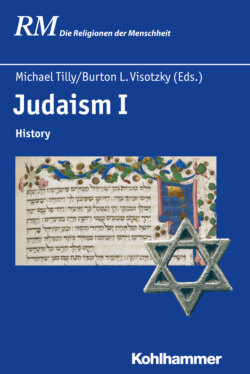Читать книгу Judaism I - Группа авторов - Страница 77
На сайте Литреса книга снята с продажи.
4 Flavius Josephus
ОглавлениеJosephus is the historian from whom we learn nearly everything we know about the Jewish rebellion against Rome in 66 CE and the lead up to it. The name Flavius Josephus was taken late in life by Judean born historian Yosef ben Matityahu, Josephus was of priestly and royal heritage, and he describes his own precocious Torah learning gleaned at the feet of Pharisaic sages.10 He was born in Jerusalem and came of age with the war itself, experiencing life in Judea under Roman procuratorial rule first-hand. He would have had intimate knowledge of the political opinions of the Judean elite. He tells us he was widely Jewishly educated, not only in Torah and its laws. He was a sort of ethnographer of his people, embedding himself in the major Jewish religious parties (sects, philosophies)—Pharisees, Sadducees, Essenes, as well as what he describes an extremist group that he calls »the fourth philosophy.« His writings, among other things, sought to teach Jewish history to and translate Jewish belief for a Roman readership.
Josephus was an unapologetically pro-Roman Jewish patriot. In other words, he was a proud Jew who thought Roman rule was divinely ordained; acquiescence was thus the best political course for the nation. As the war erupted, Josephus reports that he was swept up in it. In 66 CE he became a general of the Judean troops mustering in the Galilee (War 2.568). As the northern-most region of the land, the Galilee was the first to face the Roman armies who came overland to quell the rebellion in 66 under Nero’s general Vespasian. Josephus was quick to surrender (War 3.355–91). Vespasian took the Greek-speaking aristocrat prisoner, then, thanks to his prophecy of Vespasian’s accession to the Roman throne (War 3.399–402), Josephus was upgraded to guest of the soon-to-be emperor. As such, Josephus had a front row seat for the war. After the war Josephus settled in Rome where he wrote The Jewish War. This work was written (in Aramaic then Greek, in which it is preserved11) under Titus Flavius Vespasianus’s patronage (so explaining Josephus’s pen name: when Vespasian emancipates him, he becomes a citizen and member of the Flavian gens).12
Josephus is a remarkable and important Roman historian, but like the rest of his guild he has a strong agenda and needs to be read critically. He believed in Rome’s rightful dominion over the Jews and understood it to be God’s will—although just whose god he keeps strategically vague. Josephus, for example, puts in Agrippa II’s mouth a speech to the Jewish rebels that argues that Rome’s dominion is her destiny and that »God« is fighting on the Roman side (cf. War 2.380)—a discourse intended to resonate with right-thinking Jewish and Roman readers both. Josephus believed that Rome and Judaism can get along brilliantly, to each’s benefit and in accord with the divine plan. However, as he sees it, perversions on each side combined tragically to incite the devastating rebellion.
In order to understand what Josephus thought the ideal essence of each civilization, we can look to the depictions of and several speeches delivered by the characters of Agrippa II or Josephus himself to exemplify Judaism. On the Roman side, the speeches of Vespasian and Titus are exemplary in this regard. Yet the virtues embodied by these men, as Josephus describes it, were polluted by two groups to whom responsibility for the war can be attributed: Roman procurators and Jewish extremists (Zealots).
